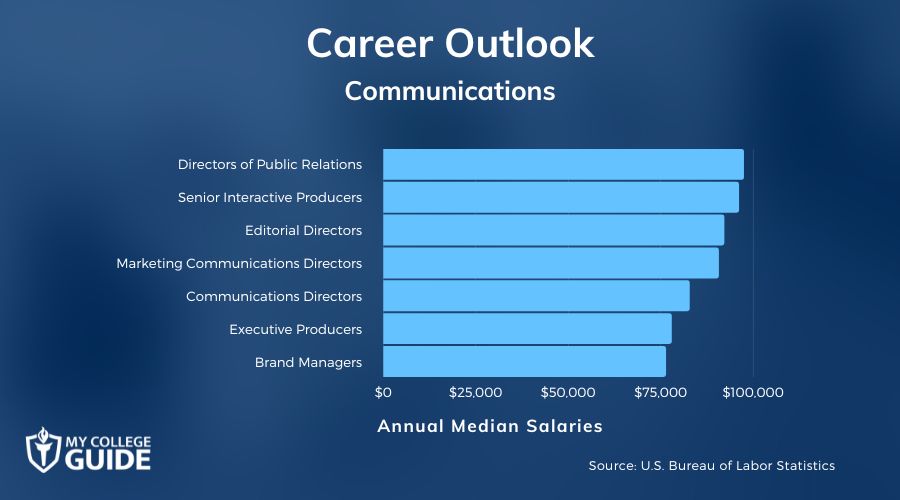Online communications degrees are a great way to foster your love for the written word. Do you thrive when talking to people out in public?

Then earning an online communications degree may be the perfect choice to take a step toward creating a long-term career out of your passion. Now, more than ever, students come from all walks of life and are often busy with family or work obligations outside of school.
Editorial Listing ShortCode:
If this sounds like you, then the flexibility of being able to log in to your college courses online can be a great solution to juggle your hectic life and still earn a respected college degree.
Online Bachelors in Communications Degrees

One of the most common online communications programs offered is the bachelor’s degree program. Earning your bachelor’s degree opens up a wider range of career opportunities, and will help set you apart in this competitive field.
Editorial Listing ShortCode:
There are several advanced communications courses that you will take throughout this study program, and typically, you will have the option to choose a concentration as well.
Some of the skills you will learn through this program include:
- Understanding mass media and society
- Advanced journalism skills
- Working with new technologies of communication
- Publication design
- Focus on skills directly related to your chosen concentration
By advancing your education with a bachelor’s in communications, you will be preparing yourself for senior-level positions within a company. This increases your potential for exciting career opportunities and a higher pay rate in the long term.
For example, after earning your bachelors in communications, you may qualify for jobs in public relations, social media, and journalism. You can opt to become a director, marketing manager, writer, or editor-in-chief.
There are many options for those who pursue communications online. You also afford the ability to work from anywhere you’re comfortable, which allows you to keep up with your daily responsibilities, such as a full-time job or a caretaker.
Common Online Communication Degree Concentrations

Communication is a vast discipline, but many online programs let you specialize in one area. Potential concentrations include:
- Broadcast Media: This specialization allows students to develop audio and visual production skills. Broadcast industry experts often lead classes and may address topics like content creation, podcasting, and radio broadcasting.
- Digital Media: This niche focuses on using digital technologies to convey information to diverse audiences. Coursework can include digital political strategy, media literacy, and mass communication.
- Film Studies: Students can expand their knowledge of cinematography, film production, and screenwriting. Classes often cover digital editing, prominent film directors, studio recording, and other subjects.
- Health Communication: This concentration explores how communication methods can educate the public about health and well-being. Students can study topics like communication ethics, health literacy, and health psychology.
- Technical Communication: This specialization prepares students for communication jobs in business, professional, and scientific organizations. Students can learn about business writing, grant proposal writing, professional communication, and rhetoric.
A concentration can help you gain advanced skills and expertise in subjects related to your personal and professional interests.
Communications Careers and Salaries

With the continual growth of the economy and the advancement of the digital age, a degree in communications can open up the door to a wide variety of career options.
To give you an idea of the career paths available, we have put together a list of some of the most popular jobs in communications and their respective mid-career salaries according to the U.S. Bureau of Labor Statistics:
| Careers | Annual Median Salaries |
| Directors of Public Relations (PR) | $97,445 |
| Senior Interactive Producers | $96,120 |
| Editorial Directors | $92,149 |
| Marketing Communications Directors | $90,674 |
| Communications Directors | $82,785 |
| Executive Producers | $77,935 |
| Brand Managers | $76,384 |
| Content Marketing Managers | $71,855 |
| Media Managers | $70,928 |
| Editor in Chiefs | $70,926 |
Whether you enjoy the financial end of business or you have a passion for production and cinema, many online communication degree programs allow you to customize your education toward a concentration that suits your interests.
When considering any career, especially one in the ever-fluctuating business world, it is essential to have an understanding of its future. Many careers are being replaced with the advancement of technology, but the communications field is a notable exception.
Every business needs effective written and public communication to develop its brand messaging, and this skill can’t be replaced by a computer. In fact, the Bureau of Labor Statistics projects that media and communication occupations will grow 6% over the next 10 years.
Editorial Listing ShortCode:
With the increased demand for companies to adapt in a growing business world, the market is primed for educated communicators to take the lead in advancing their careers. View a list of the Top 40 Communications Careers and Salaries.
Bachelor of Communications Curriculum & Courses

Numerous topics fall under the umbrella of communications, so bachelor’s in communication programs can have drastically different curricula. However, you may take some of these common courses during your studies:
- Digital Storytelling: You can learn strategies to tell compelling narratives with audio, text, video, and other multimodal elements.
- Gender, Media, and Representation: You’ll analyze how media influences and reinforces cultural ideas about gender, like stereotypes about women.
- Introduction to Communication: This foundational course introduces students to central theories and approaches to human communication.
- Mass Communication Law: You’ll study laws and legal concepts that govern mass communication, including copyright, free press, and privacy.
- Mass Media and Youth: This course explores how children and teenagers analyze and respond to media during different stages of development.
- Organizational and Small Group Communication: You’ll learn strategies to effectively communicate with others and hone skills like conflict management and decision-making.
- Principles of Public Speaking: This introductory class teaches students how to brainstorm, develop, and deliver speeches to audiences.
- Social Media Marketing: This course examines how companies can communicate information about their brands and products through social media platforms like Facebook and Twitter.
- Sports Communication: You’ll investigate how the media depicts sports in various cultures and examine how sports coverage influences society.
- Writing for the Workplace: This class teaches students how to write in common genres of workplace communication, such as memos, resumes, and emails.
Plus, communication programs frequently require students to complete internships with organizations like local newspapers and radio stations.
How to Choose an Online Communications Degree Program

Now that you have a better understanding of what careers are available after earning a degree in communications, how do you know which university is the right choice for you?
Below we will discuss some of the key areas to consider when making this important life decision.
- Accreditation: Accreditation is an essential aspect of a reputable online accounting degree program. Check to see if your chosen school is accredited.
- Student-to-Faculty Ratio: It can be important for some that your online university has a strong student-to-faculty ratio to ensure you will be able to receive individualized instruction and support throughout the course.
- Academic Advising and Student Services: College is more than just having your nose stuck in a textbook, even if you are doing classes online. The student services and academic advising support of your online university can still be an important factor in your long-term educational success.
- Cost: The cost of each program is also an important factor as you may be on a strict budget. Compare various programs to see which one fits your budget.
- Degrees Offered: Be sure to check with each school you are considering to ensure they offer your chosen degree program. Also, compare the various programs’ coursework to ensure the coursework fits with your desired career goals.
There are several factors that go into choosing an online degree program that is a good fit for your lifestyle and future goals.
Admissions Requirements

All communication programs set their own admissions criteria, but here are a few standard materials you may need to provide:
- List of extracurricular activities
- Portfolio with materials that showcase your communication skills, such as essays and videos
- Recommendation letters from coaches, club leaders, or teachers
- Resume
Some colleges and universities ask prospective students to submit ACT or SAT scores, but many schools no longer have this requirement. You can contact the admissions staff at programs of interest to learn more about the application criteria.
Communications Ongoing Education

While there are general timeframes for completing programs offering degrees online, such as two years for an associate’s or four years for a bachelor’s degree, these numbers aren’t set in stone.
If you are looking for an introduction to the communications field in order to get a jump start on your career, then an online associate’s degree in communications can be a solid option to begin your journey. After earning your bachelor’s degree, if you’re looking to move up the corporate ladder, you can consider an online master’s degree in communications.
Editorial Listing ShortCode:
Earning an online doctorate degree in communications is the crowning achievement of an educational journey, and there are several credible universities offering online doctorate communication degrees from the comfort of your own home.
Online Communications Degrees Accreditation

If you have begun the research into online universities, chances are that you have heard the term “accreditation” thrown around quite a bit – and for a good reason.
Accreditation is the voluntary process that secondary educational facilities undergo for a formal review of their academic quality and financial resources. There are a handful of regional accreditation agencies endorsed by the U.S. Department of Education.
If you are earning a degree through a college that is accredited, you can avoid the trap of falling into one of the “degree mill” type programs that are out there. When you are spending the money and effort on earning a degree in communications, you deserve to know that you will be rewarded with an education that will stand up to the requirements of your chosen field.
Financial Aid and Scholarships

Students often feel concerned about the cost of earning an online degree. However, you may meet the requirements for financial aid that can decrease your educational expenses.
The federal government offers three types of financial assistance for eligible students. The federal work-study program lets students earn money for their education by working an on-campus job. The government also awards grants based on financial need. Plus, many students take out federal student loans. You can explore these financial aid options by completing the Free Application for Federal Student Aid (FAFSA).
You may also qualify for scholarships from community and professional organizations. For example, marketing or radio broadcast associations frequently offer competitive scholarships for aspiring communications professionals. Additionally, colleges and universities often provide grants and scholarships to eligible students. You can get in touch with each school’s financial aid office to learn more.
Communications Professional Organizations

You can build relationships with professionals in your field by joining a local or national communications association, such as:
- Association for Women in Communications (AWC): This organization helps female communications specialists network and gain leadership experience.
- National Communication Association (NCA): This society publishes academic communication journals and provides professional development resources.
- Public Relations Society of America (PRSA): This leading association offers certificate programs, conferences, and career resources for public relations specialists.
Some professional organizations offer discounted student memberships, scholarships, and mentorship opportunities.
What is a Communications Major?

A communications major is a degree that focuses on the art and science of disseminating information. This broad discipline covers numerous modes of communication, such as film, radio broadcast, and writing. Students learn how to use communication methods to inform and persuade audiences.
You can develop many valuable skills by pursuing a bachelor in communications. For instance, you may hone your writing abilities by creating research papers, memos, press releases, social media posts, and other texts. Additionally, you can learn how to produce engaging multimodal projects like podcasts and video essays.
Is Communications a Good Major?

Yes, communications is a good major for many undergraduate students. This degree covers a wide range of genres, modes, and topics. For instance, students can complete a concentration in film studies, mass media, or digital or print journalism. The abundance of options means that students can study topics related to their passions.
Editorial Listing ShortCode:
Graduates who earn a bachelor in communications can pursue many career paths, like interpreter, public relations specialist, and technical writer. According to the Bureau of Labor Statistics, media and communications professionals earn a median wage of $62,340.
What Does a Communications Major Do?

Students who complete bachelor in communication degrees online may find jobs in a wide range of industries and organizations.
Some graduates pursue careers in advertising and marketing firms. They can apply their research and writing skills to develop persuasive marketing campaigns for a variety of platforms. For example, an advertising specialist could design billboards or commercials.
Other communications majors pursue journalism careers. They report on news and sporting events through digital, video, or written journalism. Additionally, graduates may use their technical and visual design skills to design mobile applications and websites.
What Jobs for Communication Majors Can I Get?

The knowledge and skills that communication majors gain during their studies can unlock many career opportunities.
Graduates frequently secure writing positions. For instance, technical writers can create accessible how-to guides and white papers for corporations, while scriptwriters develop content for film and television. Editors fact-check documents, improve style, and correct grammar and writing mistakes.
Communication majors also work for corporations as human resource specialists and public relations professionals. They may use their communication skills to address conflict and help businesses develop materials like training manuals and press releases.
How Much Does a Communications Major Make?

Many factors can affect a communication major’s salary, like their employer, geographic area, job title, and years of experience. According to the Bureau of Labor Statistics, technical writers earn a median salary of $78,060.
The average wage for public relations specialists is $62,800. Graduates who advance to the more senior position of public relations and fundraising managers make an average of $119,860. Other career paths may have lower salaries. For instance, photographers earn a median salary of $38,950, and news analysts, reporters, and journalists make $48,370 on average.
What Do You Learn in Communications?

Students who pursue a bachelor degree in communication can acquire many valuable skills as they take core courses like these:
- Fundamentals of Digital Production: This class covers digital skills like editing audio and video, graphic design, and web design.
- Interpersonal Communication: This course teaches soft skills like active listening, collaboration, and empathy.
- Public Speaking: You can learn how to develop visually appealing slideshows, convey information through oral communication, and keep your audience’s attention.
Many employers value these skills, so a bachelor in communications may help you land a preferred position.
What Can You Do With a Communications Degree?

A bachelor degree in communication can help you start or advance a career in many industries. For example, you could work in the film sector as a camera operator, producer, or video editor. This degree can also unlock careers that center on the written word.
Editorial Listing ShortCode:
You may become a technical writer and produce professional documents for an organization, or you could work as an author of novels. Advertising and marketing companies also routinely hire graduates with communications degrees. You can draw on your knowledge of persuasion and rhetoric to sell products and services.
Can I Get a Communications Degree Online?

Yes, you can obtain a communications degree fully online. Enrolling in an online communications degree offers many benefits like:
- Lower tuition costs
- Full scheduling flexibility
- Enhanced interaction opportunities to up your communication skills
- Wide range of concentrations, from TV Producing to Public Relations
- Career advancement
With millions of students taking at least one online college course, there is no better time than now to jump in and start paving the path to your future with an online degree in communications.
How Long Does it Take to Get an Online Bachelor’s Degree in Communications?

Completion timelines can vary slightly between programs, but most follow similar timelines. Typically, colleges and universities require communications majors to complete at least 120 credit hours.
You can expect to finish your degree in around 4 years if you enroll full-time and take courses during the fall and spring semesters. Some accelerated programs have 8-week semesters and allow students to stay enrolled during the summer. This format can reduce the completion time to around 3 years.
Many online programs allow students to enroll part-time and follow a more flexible schedule. These students may take 5 or 6 years to graduate.
Is a BA in Communications Online Degree Worth it?

Yes, a BA in Communications online degree is worth it for many students as the field is expected to see a 6% job growth over the next decade according to the BLS.
This degree covers a wide range of communication approaches and theories, like media literacy and the societal impact of sports. Students interested in the cultural influence and psychology of communication may find these topics compelling.
Editorial Listing ShortCode:
Graduates with bachelors in communication degrees online could have a competitive advantage when applying for jobs. This major enables students to develop many sought-after skills, such as grant writing and visual communication. These abilities can apply to numerous career paths, like author, photographer, and web designer.
Universities Offering Online Bachelor in Communication Degree Programs
Methodology: The following school list is in alphabetical order. To be included, a college or university must be regionally accredited and offer degree programs online or in a hybrid format.

Arizona State University offers a BS in Communication program fully online. Potential courses include Elements of Interpersonal Communication and Communication and the Workplace. The completion of 40 classes for a total of 120 credit hours is required. Classes tend to be 7.5 weeks long each. There are commonly several start dates offered each year.
Arizona State University is accredited by the Higher Learning Commission.

Columbus State University offers a BA in Communications program online. Tracks include General Communication Studies and Strategic Communication Management.
Potential courses include Introduction to Mass Communication, Interpersonal Communication, and Group Communication. Courses tend to follow a regular semester schedule, with start dates commonly offered for the fall, spring, and summer terms. The completion of 123 credit hours is required.
Columbus State University is accredited by the Southern Association of Colleges and Schools Commission on Colleges.

Drexel University offers an online program for a BS in Communication with an optional concentration in Public Relations. Courses are commonly offered in accelerated quarter terms, and there are usually start dates in the fall, winter, spring, and summer. Courses tend to be 10 weeks long each. Up to 135 qualified quarter credits may be transferred in from other accredited institutions.
Drexel University is accredited by the Middle States Commission on Higher Education.

Embry-Riddle Aeronautical University offers a Bachelor of Science in Communication program online. The program aims to help prepare for a career in aviation and other technical fields. The program may be customized according to interests through the choice of electives or through a minor. Courses are typically 9 weeks long each, and there are commonly 10 start dates offered each year.
Embry-Riddle Aeronautical University is accredited by the Southern Association of Colleges and Schools Commission on Colleges.

Florida International University offers a BA in Communication Arts program online. A concentration in Organizational Leadership is offered. Courses are traditionally taught in an asynchronous format. Some courses may be offered in an accelerated format, and there are typically several start dates each year.
Florida International University is accredited by the Southern Association of Colleges and Schools Commission on Colleges.

Lamar University offers a BS in Communication program online. The program offers 2 tracks, Communication Studies and Public Relations. Courses are typically 8 weeks long each, and there are usually 6 yearly start dates. Up to 90 qualified credits may be transferred in from other accredited colleges or universities.
Lamar University is accredited by the Southern Association of Colleges and Schools Commission on Colleges.

Maryville University offers a BA in Communications program online. Tracks include Strategic Communication and Emerging Media Strategy.
The program is designed to help prepare for careers in areas such as advertising, business, education, government, marketing, and media. Graduate courses may be taken during the undergrad program. Completing the program may lead to certificates from companies like Google and Amazon.
Maryville University is accredited by the Higher Learning Commission.

Northwest University offers an online program for a Bachelor of Arts in Communication. The program tends to focus on creating a faith-based learning environment. There are typically 6 start dates offered each year, and the program may be finished in less than 4 years when attending full time.
Northwest University is accredited by the Northwest Commission on Colleges and Universities.

Ohio University offers an online program for a BS in Communications. Potential courses include Media Storytelling and The Creative Process. Courses are usually taught in an accelerated format, with 3 terms commonly offered per semester. There tend to be several start dates offered throughout the year. Newsweek ranked Ohio University as the best college in the state for online education.
Ohio University is accredited by the Higher Learning Commission.

Old Dominion University offers a BA or BS in Communication program online. The degrees may also be completed as part of a degree completion program. The program requires the completion of 120 credit hours. Courses may have synchronous and asynchronous components, and some may be offered in an accelerated format.
Old Dominion University is accredited by the Southern Association of Colleges and Schools Commission on Colleges.

Purdue University offers a BS in Communications through its Global learning program. The program is fully online. Concentrations include Business Foundations, Digital Communication, and Public Relations. Courses are typically 10 weeks long each. Students may be able to earn credit for work experience.
Purdue University is accredited by the Higher Learning Commission of the North Central Association of Colleges and Schools.

Regis University offers a Bachelor of Arts in Communications online program. The program is typically taught in an accelerated format, with classes that are generally 5 or 8 weeks long each. Work on a master’s degree may start during the undergraduate program. There are often 6 start dates each year.
Regis University is accredited by the Higher Learning Commission.

San Diego State University offers a BA in Communication. The program is fully online. It is a degree completion program, so applicants must meet general education requirements before applying. Courses tend to follow a semester schedule and are generally offered for the fall, spring, and summer terms. The program may be completed in about 2 years.
SDSU is accredited by the WASC Senior College and University Commission.

Simmons University offers a BA in Communications program online. Courses may have both synchronous and asynchronous components. At least 17 credits must have been completed before admission and up to 96 qualified credits may be transferred in from accredited outside institutions. U.S. News & World Report named Simmons University among the best schools in the country for online education.
Simmons University is accredited by the New England Commission of Higher Education.

Southern New Hampshire University offers a fully online BA in Communications. Concentrations include Business Communication, Professional Writing, New Media, and Public Relations. Courses are commonly offered in 8 week blocks. Up to 90 qualified credits may be transferred in from other accredited colleges and universities. Up to 2 graduate courses may be taken as part of the BA program.
SNHU is accredited by the New England Commission of Higher Education, Inc.

The University of Arizona offers an online program for a BA in Communication. Courses aim to teach concepts related to interpersonal communication, social influence and persuasion, and the social effects of media and new information technologies. Either a minor or a double major is required. U.S. News & World Report named the University of Arizona the 10th best school in the country for online education.
The University of Arizona is accredited by the Higher Learning Commission.

The University of Arkansas offers a BA in Communication program online. The program is designed to help prepare for careers such as marketing communications, public relations, corporate communications, and media and social media consultation. The program aims to teach skills for interacting with culturally diverse populations. Tuition tends to be charged at the same rate, regardless of residency.
The University of Arkansas is accredited by the Higher Learning Commission.

The University of Central Florida offers a BS in Communication and Conflict program online. The program typically offers the opportunity to participate in conflict-resolution training and to learn how to lead negotiations in a real-world context. U.S. News & World Report ranked the University of Central Florida in the top 10 schools in the country for online bachelor’s degrees.
The University of Central Florida is accredited by the Southern Association of Colleges and Schools Commission on Colleges.

The University of Cincinnati offers a BA in Communication through its online learning program. Potential courses include Business Communication, Introduction to Rhetorical Theory, Communication Research Methods, and Communication in Problem-Solving Groups.
The program is designed to help prepare for positions in human resource management, marketing, public relations, law, and business. Courses are typically taught in an asynchronous format.
UC is accredited by the Higher Learning Commission.

The University of Colorado–Colorado Springs offers a Bachelor of Arts in Communication program online. Concentrations include Applied Digital Media Studies and Professional Communication in the Digital and Virtual World. The degree may be customized through the selection of electives. Courses are typically 8 weeks long or less, offering course completion in an accelerated format.
UCCS is accredited by the Higher Learning Commission.

The University of Illinois–Springfield offers an online program for a BA in Communication. A goal of the program is to provide the skills needed to apply knowledge of general communication theory and technology to specific social problems. General education requirements must be met before applying to the online program. The program requires the completion of 36 credit hours, which is often accomplished in 16 months.
UIS is accredited by the Higher Learning Commission.

The University of Louisville offers an online program for a Bachelor of Arts or a Bachelor of Science in Communication. Courses are commonly taught in an asynchronous learning format. Major-specific requirements may be able to be completed in as little as 2 years. U.S. News & World Report named the University of Louisville among the best schools for online bachelor’s degrees.
The University of Louisville is accredited by the Southern Association of Colleges and Schools Commission on Colleges.

The University of Missouri–St. Louis offers a BA in Communication program that is fully online, except for a required internship or practicum. Up to 60 qualified hours may be transferred in from other accredited institutions. Courses tend to follow a semester schedule. An optional certificate in Health Communication may be earned as part of the program.
The University of Missouri – St. Louis is accredited by the Higher Learning Commission.

The University of New Hampshire offers a BS in Professional Communication program online but with the option to take some courses on campus. Concentrations include Business and Strategic Communication, Interpersonal and Organizational Communication, and Visual Communication and Social Media. Courses are usually 8 or 12 weeks long each, depending on the semester.
The University of New Hampshire is accredited by the New England Commission of Higher Education.

The University of North Dakota offers 2 online BA in Communication degree programs online. One program is self-paced, and each course must be finished in 3 to 9 months. The other is semester-based. Both programs lead to the same degree. An internship must also be completed as part of the program.
The University of Dakota is accredited by the Higher Learning Commission of the North Central Association of Colleges and Schools.

The University of Minnesota offers a BA in Communication program fully online. Concentrations include Social Media, Communication Studies, Organizational Communications and Public Relations. Courses tend to follow a semester schedule, with start dates often offered for the fall, spring, and summer terms.
The University of Minnesota is accredited by the Higher Learning Commission.

The University of Texas–Permian Basin offers a BA in Communication program online with courses typically taught in an asynchronous format. Specialty tracks include Strategic Marketing and Sports Media. Courses are commonly offered in full and half semesters, and there are usually several start dates offered each year.
The University of Texas Permian Basin is accredited by the Commission on Colleges of the Southern Association of Colleges and Schools.

The University of Texas–San Antonio offers a Bachelor of Arts in Communication program online. Most coursework may be completed asynchronously. The program requires the completion of 120 credit hours and up to 66 qualified credits may be transferred in from other accredited schools. Five extra courses may also be completed to earn a Digital Communication concentration.
The University of Texas at San Antonio is accredited by the Southern Association of Colleges and Schools Commission on Colleges.

Walden University offers a BA in Communications through the school’s fully online program. Concentrations include Healing, Hierarchy, Healthcare, and Wholeness, Organizational Society, Branding, Global Citizenship, and Possibilities, Problems, and the Human Condition. Courses are offered in quarter semesters, and the completion of 181 quarter credits is required.
Walden is accredited by the Higher Learning Commission.

Western Illinois University offers an online program for a BA in Communication. Potential courses include Introduction to Human Communication, Argumentation, Quantitative Research Methods in Communication, and Interpersonal Communication.
The completion of 42 credit hours in the major’s core courses is required. The program may be customized through electives, and the program also requires a minor in an approved field.
Western Illinois University is accredited by the Higher Learning Commission.
Getting Your Bachelor’s in Communication Degree Online

When it comes to an online communications degree program, there are a wealth of options open to you. Whether you are a student fresh out of high school or a seasoned professional looking to advance an already stellar career, online degree programs offer a high level of customization and flexibility to assist you in your long-term goals.
By closely examining the credentials of your online college choice and dedicating yourself to the commitment involved, an online degree in communications may be your ticket to a versatile career that lets you live out your passion.
To kick start your communication bachelor’s degree journey, you can begin researching accredited online schools that offer your chosen degree program.
